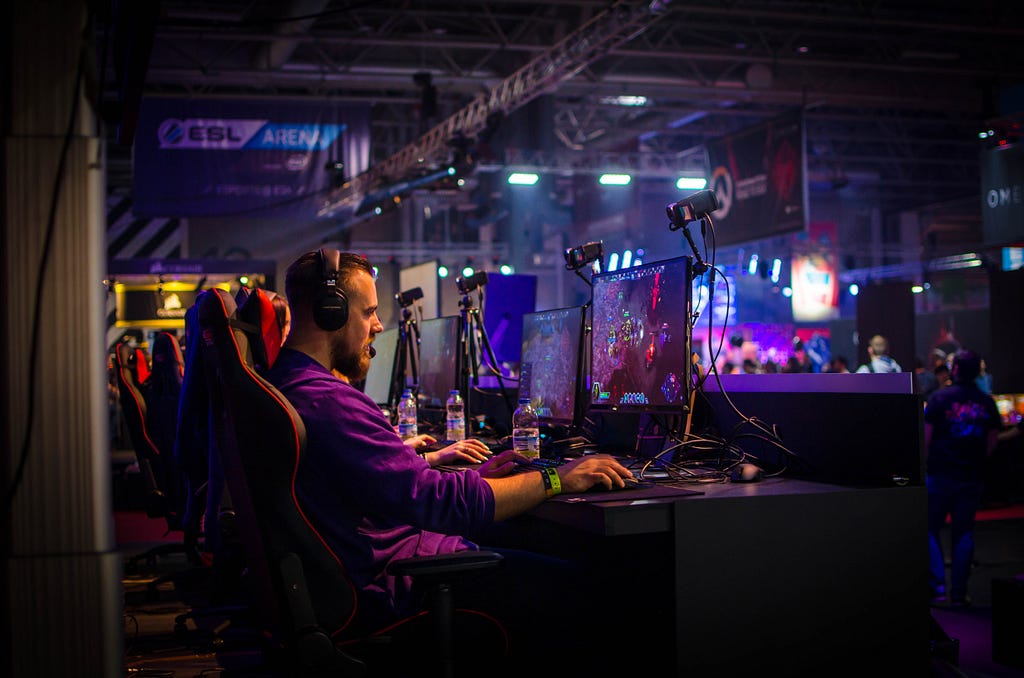Latest news about Bitcoin and all cryptocurrencies. Your daily crypto news habit.

It’s not just that esports had a significant growth — now the traditional, real sports must catch up. The esports industry generated a whopping $1.5 billion total revenue in 2017 and is still growing. There are 2.2 billion gamers in the world, which means every 1 in 4 people is a gamer.
Yet in this multi-billion industry, the ones who have the least say are the players.
Veasna “SNA” Sokhom was a Dota 2 player who was tied as the top player in Valve’s Dota 2 leaderboard for six weeks. Despite being a rising player at the time, he only earned about $400 from tournament prize pools before leaving competition. He had to take a part time job to help his mom.
No one can truly make a living from games, unless they rank top every time, or take other measures such as livestreaming, or work as game testers.
And these measures have their downsides too: not everyone can rank top, which leaves out a large portion. Livestreaming means living on subscriptions and ads, so something really unique and compelling must be offered to get that user base. And testing games for work is still work.
Many have taken note of this problem, and offered different solutions. Blast, for instance, awards users with micro savings every time they complete an objective in a game. But according to WAX, 2/3rds of the gamers want more opportunities to use cryptocurrency within video gaming.
The Obvious Reason
We are looking at an industry, which needs to incentivize both sides:
1- Players, to keep playing the games
2- Game developers, to get greater longevity for their games
Without blockchain, payouts to players could take weeks, lots of paper work and transaction fees, and a middle party takes a large cut. As mentioned in the excellent piece by Peter McCormack, the current banking systems require a lot of form filling, questioning, low interest rates and slow transactions while not offering full protection either.
With blockchain, these payouts are not only instant, but also much more frequent, with a larger share for the players to earn and far less hassle to go through. It’s also much easier to automate and create a platform around, while being infinitely more transparent too.
This not only means more people who can earn by playing games, but also game developers can create longer attraction for their work. The process becomes incredibly easier for both sides.
Despite the crackdown on blockchain projects worldwide, 55% of millennial gamers own cryptocurrency, and 80% of the gamers are interested specifically in using cryptocurrency to make transactions within video gaming. When it comes to games, crypto has the upper hand.
Supporting the Game Makers
“A lot of games die off after the hype and launch, either because the gamer completes the game or finds no other reason to keep playing.” — said Lex Na, CEO of Bountie. “The reason games like Dota 2 and Counterstrike have been around for many years is their competitive element: there are tournaments and huge prize pools attracting gamers to train harder and play more. Resulting in longevity in those games. So similarly, by opening up a channel for tournament organizers to host tournaments through Bountie’s platform for any and every game, many of these games that would have died off have another reason for gamers to continue playing and honing.”
Like Veasna, Lex — who was ranked 8th in the World in Warcraft 3 — realized that eventually, playing games and being great at what you love does not pay for your bills and lifestyle. But, Lex decided to change that and founded Bountie.
It Doesn’t Stop There
Besides tournaments and completing in-game objectives, many games offer in-game assets that can be purchased or traded. Monetizr is one of those, where players can use their MTZ tokens — which they earn by playing games and hitting in-game achievements — to purchase physical or virtual in-game products or to exchange to other cryptocurrencies.
Bountie has taken an extra step; it gives users full control over their gaming profile. This will allow professional teams to find their potential team members much easier, and gamers to find prospective partners or sponsors. More importantly, the gamers are the true owners of their data. Thus, while the system allows advertisers to micro-target the gamers, the players have the option to earn tokens in return — or they can disable access to their profile.
There is yet another way for players to make profits; betting. Unikrn, which is an active gaming platform where players earn UKG by winning matches or converting their earned in-game skins, is following up with skill-based crypto betting. Thus, Unikrn has created a full eco system where pay-to-enter tournaments as well as prizes won and bets made are all happening on their cryptocurrency — something that would be expensive and slow on traditional money, to say the least.
Closing Thoughts
Everyone loves games, at least most of the people I know do. Playing is a sport for the mind, and there are suggestions to make esports part of the Olympics. As this industry grows, the new problems that emerge must be addressed.
Blockchain is about incentivizing and bringing power to the gamers and game developers who are the actual ones that fuel the industry. They are the ones who should have the final say.
The Inevitable Next Step for eSports was originally published in Hacker Noon on Medium, where people are continuing the conversation by highlighting and responding to this story.
Disclaimer
The views and opinions expressed in this article are solely those of the authors and do not reflect the views of Bitcoin Insider. Every investment and trading move involves risk - this is especially true for cryptocurrencies given their volatility. We strongly advise our readers to conduct their own research when making a decision.
